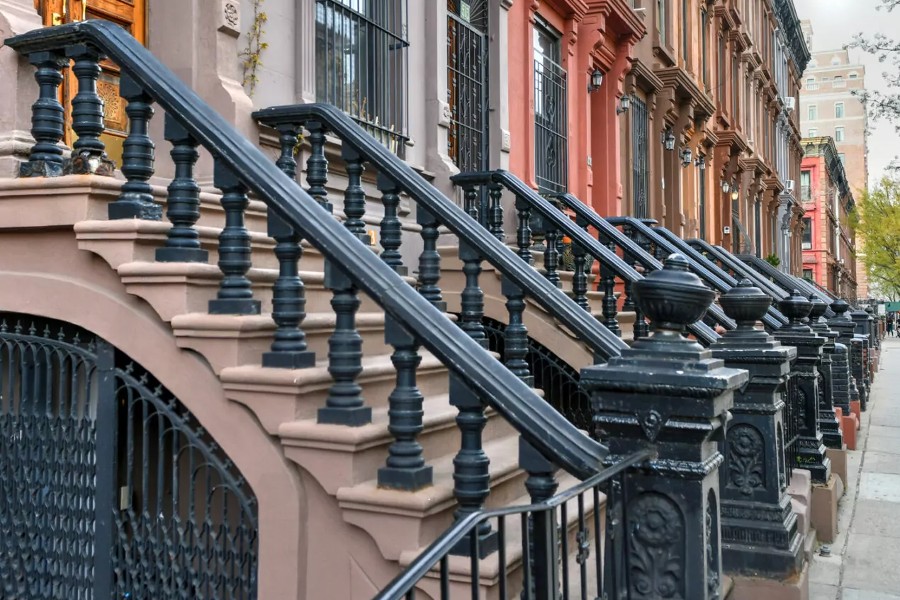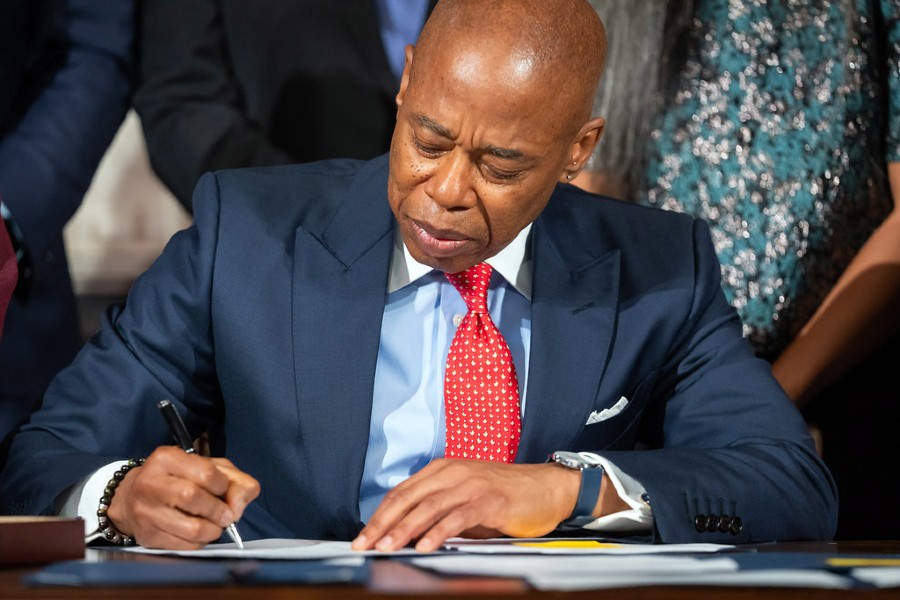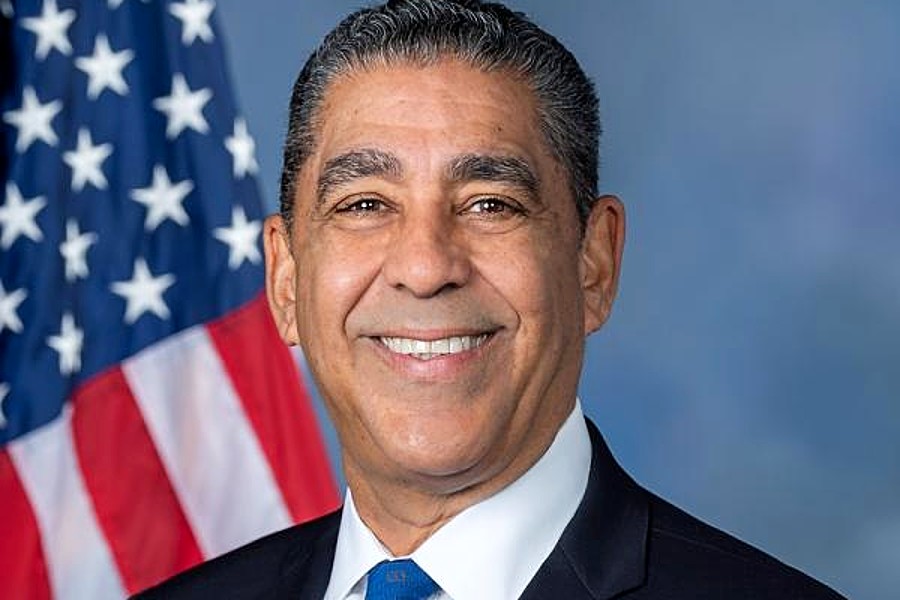
The Landmarks Preservation Commission (LPC) today marked the end of 2023 with a detailed accounting of the year’s achievements.
Including big wins in the Commission’s efforts to advance equity and inclusion across all aspects of the agency’s work, decisive steps to strengthen protections for vulnerable landmark buildings, and meaningful changes to the agency’s regulatory process, unlocking the potential of landmark buildings to support the city’s bold climate resiliency efforts and economic development initiatives.
“The past few years have demonstrated the power of preservation to revitalize communities, support economic development, drive investment into existing buildings, enhance New York City’s appeal to visitors, and instill community pride in neighborhoods,” said Landmarks Preservation Commission Chair Sarah Carroll. “I’m tremendously proud of the Commission’s achievements this year in delivering on its mission to protect and preserve this city’s historic resources, ensuring the values of equity and inclusion continue to drive work across the agency, and fostering an environment in which New York City’s designated landmark resources can continue to play a key role in the ongoing economic success and vitality of our city.”
Highlights from 2023 include:
Prioritizing Equity and Inclusion in Designations
LPC continued to advance its Equity Framework goals, including enhancing transparency and accessibility in the Commission’s regulatory work, and prioritizing designations that represent New York City’s diversity and designations in areas less represented by landmarks.
In 2023, the Commission designated four new individual landmark sites in the Bronx: Joseph Rodman Drake Park and Enslaved People’s Burial Ground, the Bronx Opera House, Engine Company 88/ Ladder Company 38 Firehouse, and Fire Alarm Telegraph Bureau, Bronx Central Office. LPC’s commitment to expanding the geographic diversity of designations also included the designation of the Linden Street Historic District – the first historic district designated in Bushwick, Brooklyn – as well as the designation of two modern buildings as individual landmarks, including the Barkin, Levin & Company Office Pavilion in Queens, which is an area less represented by landmarks.
The Commission continued to ensure its designations told the story of all New Yorkers with five new landmark sites associated with Black history, including Drake Park and Enslaved People’s Burial Ground (referenced above) and the (Former) Colored School No. 4, the only known surviving building in Manhattan that exclusively served Black Americans during the troubled period of mandated racial segregation in New York City public schools. In May, LPC designated (Former) Colored School No. 4 as an individual landmark and joined Mayor Adams and DSNY to announce $6 million in funding for the rehabilitation of the historic site.
“…Harlem’s Hotel Cecil & Minton’s Playhouse Building.”
LPC also designated three buildings with ties to Jazz history in 2023: 935 St. Nicholas Avenue Building in Washington Heights (longtime home of two jazz pioneers, Edward Kennedy “Duke” Ellington and Noble Lee Sissle); the John Birks “Dizzy” Gillespie Residence in Corona, Queens; and Harlem’s Hotel Cecil & Minton’s Playhouse Building. All three sites were identified as part of a citywide Commission survey of sites associated with significant Black history, and reflect LPC’s ongoing commitment to prioritizing designations that represent New York City’s diversity.
Helping Make New York City More Climate Resilient
LPC believes landmark buildings can and should be climate resilient and energy efficient, and that the city’s historic resources have an important role to play as we move towards a more sustainable New York City. In July, the Commission approved a series of new rules designed to help the city advance new energy efficiency and climate resiliency codes and standards by making the application process faster and easier for business owners and individual homeowners seeking agency approval for specific types of work, including building updates that would improve the climate resiliency and sustainability of landmarked properties. The new rules make the permit process for sustainability and resiliency improvements more efficient by expanding the range of solar panel installations eligible for staff-level review, as well as energy-efficient HVAC unit upgrades. The changes approved by LPC in 2023 will help make for a greener New York City in the years to come by addressing new and expanded tree pits and greening of sidewalks in historic districts, allowing for planting beds and bioswales.
Supporting New York City’s Small Businesses and Business Owners
LPC continued its commitment to New York City’s economic success, helping advance the Adams’ Administration’s “Get Stuff Built” initiative by approving new rules in 2023 that make the application process more flexible for small business owners citywide, and codifying additional options for specific types of commercial signage and other provisions related to storefronts. These new provisions are the latest in a series of recent Commission initiatives designed to support New York City businesses, including LPC’s Business Express Service, a one-stop shop with a dedicated agency team to make it easier and faster for business owners in landmark buildings to apply for and receive the permits they need. The changes implemented by LPC in 2023 are designed to provide a faster, more efficient permitting process, enabling business owners to focus on the success of their businesses – and ultimately creating expanded employment opportunities for the City’s diverse workforce.
Strengthening Tools to Protect New York City’s Vulnerable Landmark Buildings
LPC joined Mayor Adams and the Department of Buildings (DOB) to launch the Vulnerable Buildings Action Plan, partnering with DOB to strengthen enforcement tools that will preserve the city’s most vulnerable historic buildings. The plan will help aid in protecting buildings designated as historic landmarks that are at risk due to pre-existing unknown structural conditions, owner neglect, and contractor negligence, and focuses on early detection of risks to designated buildings, more robust engineering oversight, increased coordination, and communication between LPC and DOB, and enhanced community tools, including new digital tools. In developing the plan, LPC engaged with a broad set of stakeholders, leveraging the expertise of preservation advocates, property owners, architects and engineers representing a diverse set of backgrounds.
As a result of the plan, LPC has enhanced its community outreach to local advocacy groups and community boards to support information sharing, added enforcement staff to provide supplemental oversight, introduced an expanded engineering review, and expanded data-sharing procedures with DOB to identify at-risk buildings earlier in the process. Additionally, LPC is planning to make it even easier for New Yorkers to access information on all of the city’s designated landmark buildings and sites with the introduction of new online tools scheduled for release in the new year.
The Landmarks Preservation Commission (LPC)
The Landmarks Preservation Commission is the mayoral agency responsible for protecting and preserving New York City’s architecturally, historically, and culturally significant buildings and sites. Since its creation in 1965, LPC has granted landmark status to more than 37,900 buildings and sites, including 1,459 individual landmarks, 121 interior landmarks, 11 scenic landmarks, and 156 historic districts and extensions in all five boroughs.
For more information, visit www.nyc.gov/landmarks
Photo credit: Harlem stoop.
- LISC CEO Michael T. Pugh Recognized Among 2024 Worthy 100 Leaders
- NY Lawmakers Celebrate Historic MENA Data Recognition Bill Signed By Hochul
- Sponsored Love: Leadership Skills Training Courses: Invest In Your Future Today
- Senator Hoylman-Sigal Calls On Independent Schools To Adopt NYC Public School Calendar
- Mayor Adams Celebrates 65 Million NYC Visitors In 2024, Second-Highest Ever
Become a Harlem Insider!
By submitting this form, you are consenting to receive marketing emails from: . You can revoke your consent to receive emails at any time by using the SafeUnsubscribe® link, found at the bottom of every email. Emails are serviced by Constant Contact









